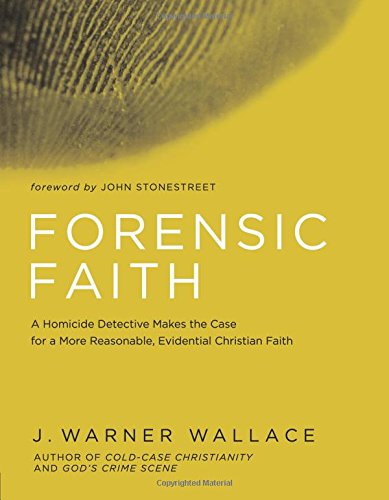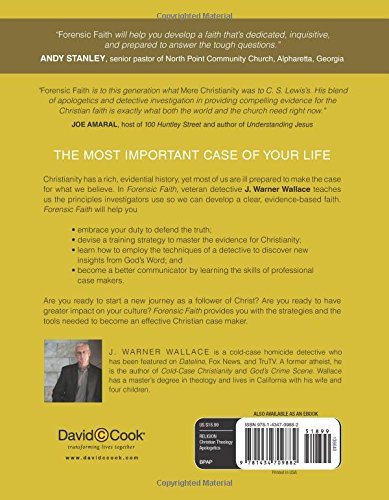When I picked up Forensic Faith, I thought I was getting a catchy Christian book, that was going to make some clever parallels between police work and faith, not a the writings of an author who actually have worked in homicide for most of his career. I was totally off- J. Warner Wallace worked as a homicide detective for over 24 years, and the way he processes Christianity is different from any book I’ve ever read.
There’s a special genre to apologetics and you start to realize that certain people’s minds are made up different in the investigative crowd- they just process things different than your average joe. That’s exactly how it was when I read Lee Strobel’s Case for the Creator books- he was a investigative reporter for years before he wrote his best-selling series. Wallace really comes from the same place of deep study and practical, provable, knowledge.
Why is Forensic Faith Different?
While many Christian books on faith are focused on experiences or exploration of the Bible (both good things), Forensic Faith makes a strong case for apologetics being a huge part of Christianity.
Wallace explains that while some people may say, “I don’t really need any evidence. I just believe Christianity is true. I don’t think I can argue someone into the kingdom anyway.” Strong evidence is actually a big part of growth in Christianity.
“There’s a big difference between accidental and evidential belief, even though both may lead you to the same conclusion. There are times when accidental belief will land you in the right place, but it seldom stands up to aggressive challenges, and it is often less than persuasive.”
C.S. Lewis actually pushed in this direction as well saying, “Christianity is a statement which, if false, is of no importance, and, if true, is of infinite importance. The one thing it cannot be is moderately important.”
Taking a half-hearted approach to Christianity while failing to examine it, back it up and learn the actual, historical, real truth behind the Bible, results in Christians who are stunted in their growth and afraid that culture actually has the jump on their faith.
Why is Forensic Faith Needed?
Wallace points to a few statistics that are fairly alarming about teenage Christians especially- while they may “be churched” and actually know theological things about God, they don’t actually believe those things.
“Sixty-three percent of teenage Christians don’t believe Jesus is the Sn of God; 51 percent don’t believe Jesus rose from the dead; 68 percent don’t believe the Holy Spirit is a real being.”
It’s hard to believe what you can’t articulate or defend, right?
What Does Forensic Faith Explore?
Honestly, I’ve done a lot of Biblical study. I know most of the answers to the tough questions about biblical contradictions (spoiler alert, there aren’t any), historical events, and copy-cat religions. However, the ways that Wallace expounds on Biblical truths are great reenforcement for the Biblically savvy or the new in faith.
For example, when explaining the difference between Christianity and other religions, Wallace writes this,
“Wisdom statements are difficult to validate evidentially. You have to either accept my story or reject it, but in either case, you’ll have to do so without the ability to investigate my claims evidentially. You can’t, after all, get into my head to see if I am lying about this very personal “revelation.” What if on the other hand, I told you I had been listed by God physically. God came to me in the form of a man and, in the presence of my friends, had lunch with me in my backyard. While he was there, he helped me dig a trench for my irrigation line and even put some finished touches on a treehouse for me kids. Can you see how this kind of public claim is categorically different from private claims about vision and divine wisdom?”
Wallace doesn’t just dive into the practical defenses of Christianity though, he also explores the Biblical command to examine, be fully convinced, be reasoning, etc- essentially the Biblical command to reason:
“Do not quench the Spirit; do not despise prophetic utterances. But examine everything carefully; hold fast to that which is good.” -1 Thessalonians 5:19-21
“Beloved, do not believe every spirit, but test the spirits to see whether they are from God; because many false prophets have gone out into the world.” -1 John 4:1
“For certain person have crept in unnoticed, those who were long beforehand marked out for this condemnation, ungodly persons who turn the grace of God into licentiousness and deny our only Master and Lord, Jesus Christ… But these men revile the things which they do not understand; and the things which they know by instruct, like unreasoning animals, by these things they are destroyed.” -Jude 4, 10
Do the Reformed Need Apologetics?
Wallace anticipates a lot of the struggle people have with apologetics and even anticipates a reformed argument. Why use apologetics if God has predestined those he saves? Wallace admits that he has a flawed analogy, but asserts that God removes the enmity by the application of His holy spirit before someone is saved, and with that enmity removed, He allows us to play a role in presenting an evidential case for Christianity.
Bottom Line
Forensic Faith is a solid books, check it out, read it, I feel like more people should be involved in apologetics as a part of their theology, because understanding Christianity as a historical fact, not just a faith based act, is essential to understanding who God is and what He has done.
About the author:
J. Warner Wallace is a cold-case homicide detective, popular national speaker and best-selling author. He continues to consult on cold-case investigations while serving as a Senior Fellow at the Colson Center for Christian Worldview. Find more about Wallace at coldcasechristianity.com







0 Comments